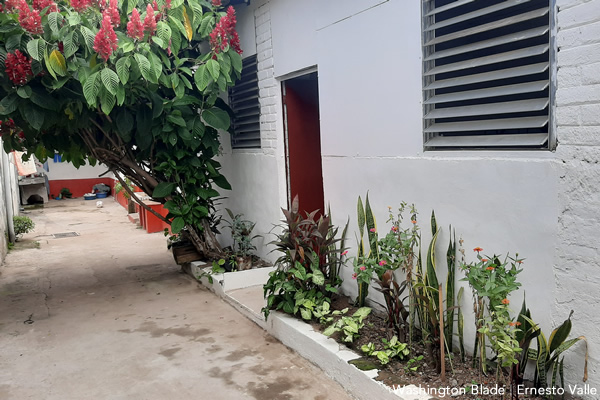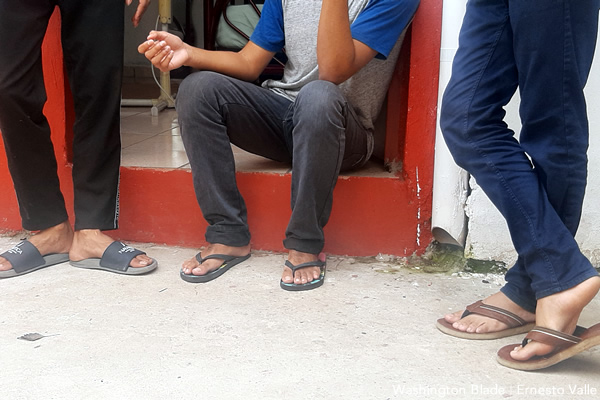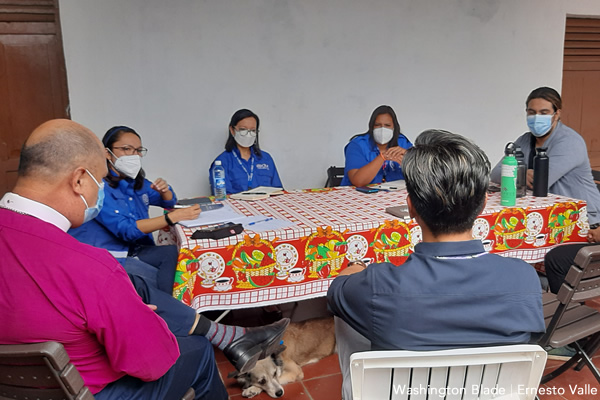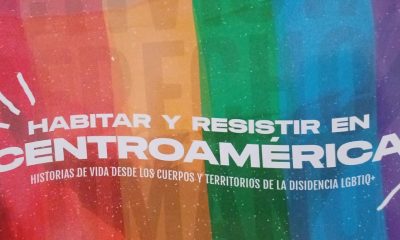World
LGBTQ youth find refuge at church-run shelter in El Salvador
Hogar Santa Marta opened in August

The Washington Blade published a Spanish version of this article on Oct. 25.
SAN SALVADOR, El Salvador — LGBTQ youth in El Salvador frequently face violence in their families and communities, and this abuse often happens with impunity. Many of these community members have either fled their homes or have been kicked out of them because they are not accepted for who they are.
A shelter that supports this vulnerable population has opened.
The Anglican Episcopal Church of El Salvador in 2009 created its Sexual Diversity Ministry, a pastoral mission that brings together LGBTQ people and their communities. The ministry has become a space in which everyone can live their faith free of discrimination.
Hogar Santa Marta opened in August, and is one of the ministry’s initiatives.
Bishop Juan David Alvarado of the Anglican Episcopal Church of El Salvador told the Washington Blade this project responds to human needs, especially when there is so much injustice. He said the shelter is a temporary home for young people as they work to solve their problems or find a way to better themselves.
“We as a church wanted to give an answer to LGBTQ people who have suffered human rights violations,” said Alvarado.
Hogar Santa Marta has already helped a number of LGBTQ young people. Three of them moved into the shelter and others have been able to receive assistance at their time of need.
“Our first option is that people do not necessarily have to experience family abandonment, so it is about achieving a conciliation with families,” explained Cruz Torres, coordinator of the Anglican Episcopal Church of El Salvador’s Sexual Diversity Ministry. He added the goal is to allow these young people to remain with their families.
Young people as of now primarily contact the shelter through its social media networks. A technical team evaluates the cases and then determines the way to proceed with each of them based on whether they are victims of violence or forced displacement or have been kicked out of their homes.
“This method of using networks has been deliberate in order to control our growth and not to have an immediate saturation,” said Hogar Santa Marta Director Eduardo Madrid, who explained the shelter’s opening was delayed because it was not ready to support young people who need support.
Helen Jacobo, the shelter’s psychologist, and Madrid created a protocol to determine the process to use with a person who is seeking help.
The technical team creates a profile of the person when it establishes contact with them and notes the situation in which they are living. It then passes this information along to the psychologist who will then schedule an interview.
“We can find out about their support networks, if they have a shelter or a safe place (to live) through a small interview,” said Jacobo.
‘I feel more complete and more secure’
Carlos, 25, sought the shelter’s support because of a series of the problems the pandemic made worse.
“I had to leave my house because of mistreatment, insults and beatings,” he recalled.
Carlos said he was relieved to arrive at a safe place, and even more so when he knew that he would have a lot of support.
“They have provided me with a lot of services, such as psychosocial support and I will get a job very soon,” he said with joy.
The shelter first offers its residents a place to live with access to regular meals and psychological therapy to address the traumas they have experienced. The shelter also accepts donations to provide residents with their basic needs.
“For my part I am very grateful, we have worked on ourselves as a person,” said Carlos with an assured look that conveys happiness from behind a face mask with a smile drawn onto it. He also expressed that he is grateful the shelter allowed him to live there with his pet that he took with him when he left his house.
Religion is not imposed upon the shelter’s residents, even though a church group created it.
“If you want to believe, you believe,” said Carlos. “They don’t impose religion on you.”
“I feel more complete and more secure,” he added, while saying that he has learned to put himself first. “That has been the most noticeable change that I have been able to have.”
With this self-empowerment in mind, the second stage for the shelter’s residents is to learn how to fight for their rights and know how to maintain them. Sustainable relocation, family awareness and creating a life plan are also part of this effort.
Alejandro, 23, has already been able to leave the shelter with the technical team’s support. He was able to get a job and find a new place to live.
He learned about the shelter from a friend who is a member of the Anglican Episcopal Church of El Salvador. The friend helped him present his case and he became the first young person to live in the shelter.
“Even though I was only there for a month, I felt the necessary support from the whole team,” says Alejandro.
He said he feels very involved with the shelter because he is its first successful case.
Alejandro said he had the opportunity during his first meetings to propose ideas about how the shelter can approach future cases. Alejandro added it was very rewarding to him that both the director and the psychologist took his thoughts into account.
Now that he has been able to find a job, Alejandro said he will do everything he can to remain stable. He will particularly rely on the psychological support the shelter still provides him, which is the third stage of its work. This support lasts for up to a year after admission and is supported through an alliance with NGO’s, the government and private companies.

Strategic alliances
Hogar Santa Marta has made a variety of strategic alliances that allow it to carry out its work. One of them is with the U.N.’s International Organization for Migrants and specifically with its Integrated Responses on Migration from Central America project.
The shelter hopes to use this partnership to further develop a psychosocial program that will be able to help more vulnerable LGBTQ youth. Hogar Santa Maria hopes it can use some of these same strategies that IOM uses.
“Some of the instruments that they have specifically respond to psychological issues,” Jacobo explained.
Hogar Santa Marta’s programs have been made available to IOM in order to improve the way it views sexual diversity-related issues. They also hope to receive support for when they implement a group management program once more LGBTQ youth live in the shelter.
Rosalinda Solano, the national coordinator of the IOM project, said she is very interested in following up on the in-home work and hopes to enter into a collaboration with the shelter, such as the one that provides psychosocial support to LGBTQ people who have been returned to the country.
“We have also managed to identify other possible links, through profiles that can be linked to job opportunities,” she said.
Solano said the project seemed to be something very innovative and needed in the country, which does not have anything else. She hopes it will do something that has not been done before in El Salvador.
“It takes a fairly comprehensive approach, not it is just providing shelter,” she said.
There are two other shelters in El Salvador that specifically serve the LGBTQ community—ASPIDH ARCOIRIS TRANS’ Casa Trans and COMCAVIS TRANS’ Casa Refugio Karla Avelar—but they primarily serve displaced transgender women. Hogar Santa Marta is the first LGBTQ shelter in El Salvador that a church created.
“Young people see home with great hope for a new life,” said Alvarado.
The shelter can be found at Facebook as Santa Marta LGBT and on Instagram as @santamartalgbt. There is a link to a GoFundMe account there where donations can be made.
“We as a church recognize LGBTIQ+ people’s prophetic voice and we accept God’s call to care, direct and guide all people who face social injustice,” said Alvarado.

Ecuador
Justicia reconoce delito de odio en caso de bullying en Instituto Nacional Mejía de Ecuador
Johana B se suicidó el 11 de abril de 2023

A casi tres años del suicidio de Johana B., quien estudió en el Instituto Nacional Mejía, colegio emblemático de Quito, el Tribunal de la Corte Nacional de Justicia ratificó la condena para el alumno responsable del acoso escolar que la llevó a quitarse la vida.
Según información de la Fiscalía, el fallo de última instancia deja en firme la condena de cuatro años de internamiento en un centro para adolescentes infractores, en una audiencia de casación pedida por la defensa del agresor, tres meses antes de que prescriba el caso.
Con la sentencia, este caso es uno de los primeros en el país en reconocer actos de odio por violencia de género, delito tipificado en el artículo 177 del Código Orgánico Penal Integral (COIP).
El suicidio de Johana B. ocurrió el 11 abril de 2023 y fue consecuencia del acoso escolar por estereotipos de género que enfrentó la estudiante por parte de su agresor, quien constantemente la insultaba y agredía por su forma de vestir, llevar el cabello corto o practicar actividades que hace años se consideraban exclusivamente para hombres, como ser mando de la Banda de Paz en el Instituto Nacional Mejía.
Desde la muerte de Johana, su familia buscaba justicia. Su padre, José, en una entrevista concedida a edición cientonce para la investigación periodística Los suicidios que quedan en el clóset a causa de la omisión estatal afirmó que su hija era acosada por su compañero y otres estudiantes con apodos como “marimacha”, lo que también fue corroborado en los testimonios recogidos por la Unidad de Justicia Juvenil No. 4 de la Fiscalía.
Los resultados de la autopsia psicológica y del examen antropológico realizados tras la muerte de Johana confirmaron las versiones de sus compañeras y docentes: que su agresor la acosó de manera sistemática durante dos años. Los empujones, jalones de cabello o burlas, incluso por su situación económica, eran constantes en el aula de clase.
La violencia que recibió Johana escaló cuando su compañero le dio un codazo en la espalda ocasionándole una lesión que le imposibilitó caminar y asistir a clases.
Días después del hecho, la adolescente se quitó la vida en su casa, tras escuchar que la madre del agresor se negó a pagar la mitad del valor de una tomografía para determinar la lesión en su espalda, tal como lo había acordado previamente con sus padres y frente al personal del DECE (Departamento de Consejería Estudiantil del colegio), según versiones de su familia y la Fiscalía.
#AFONDO | Johana se suicidó el 11 de abril de 2023, tras ser víctima de acoso escolar por no cumplir con estereotipos femeninos 😢.
Dos semanas antes, uno de sus compañeros le dio un codazo en la espalda, ocasionándole una lesión que le imposibilitó caminar 🧵 pic.twitter.com/bXKUs9YYOm
— EdicionCientonce (@EdCientonce) September 3, 2025
“Era una chica linda, fuerte, alegre. Siempre nos llevamos muy bien, hemos compartido todo. Nos dejó muchos recuerdos y todos nos sentimos tristes; siempre estamos pensando en ella. Es un vacío tan grande aquí, en este lugar”, expresó José a Edición Cientonce el año pasado.
Para la fiscal del caso y de la Unidad de Justicia Juvenil de la Fiscalía, Martha Reino, el suicidio de la adolescente fue un agravante que se contempló durante la audiencia de juzgamiento de marzo de 2024, según explicó a este medio el año pasado. Desde entonces, la familia del agresor presentó un recurso de casación en la Corte Nacional de Justicia, que provocó la dilatación del proceso.
En el fallo de última instancia, el Tribunal también dispuso que el agresor pague $3.000 a la familia de Johana B. como reparación integral. Además, el adolescente deberá recibir medidas socioeducativas, de acuerdo al artículo 385 del Código Orgánico de la Niñez y Adolescencia, señala la Fiscalía.
El caso de Johana también destapó las omisiones y negligencias del personal del DECE y docentes del Instituto Nacional Mejía. En la etapa de instrucción fiscal se comprobó que no se aplicaron los protocolos respectivos para proteger a la víctima.
De hecho, la Fiscalía conoció el caso a raíz de la denuncia que presentó su padre, José, y no por el DECE, aseguró la fiscal el año pasado a Edición Cientonce.
Pese a estas omisiones presentadas en el proceso, el fallo de última instancia sólo ratificó la condena para el estudiante.
Africa
LGBTQ groups question US health agreements with African countries
Community could face further exclusion, government-sanctioned discrimination

Some queer rights organizations have expressed concern that health agreements between the U.S. and more than a dozen African countries will open the door to further exclusion and government-sanctioned discrimination.
The Trump-Vance administration since December has signed five-year agreements with Kenya, Uganda, and other nations that are worth a total of $1.6 billion.
Kenyan and Ugandan advocacy groups note the U.S. funding shift from NGO-led to a government-to-government model poses serious risks to LGBTQ people and other vulnerable populations in accessing healthcare due to existing discrimination based on sexual orientation.
Uganda Minority Shelters Consortium, Let’s Walk Uganda, the Kenya Human Rights Commission, and the Center for Minority Rights and Strategic Litigation note the agreements’ silence on vulnerable populations in accessing health care threatens their safety, privacy, and confidentiality.
“Many LGBTQ persons previously accessed HIV prevention and treatment, sexual and reproductive health services, mental health support, and psychosocial care through specialized clinics supported by NGOs and partners such as USAID (the U.S. Agency for International Development) or PEPFAR,” Let’s Walk Uganda Executive Director Edward Mutebi told Washington Blade.
He noted such specialized clinics, including the Let’s Walk Medical Center, are trusted facilities for providing stigma-free services by health workers who are sensitized to queer issues.
“Under this new model that sidelines NGOs and Drop-in Centers (DICs), there is a high-risk of these populations being forced into public health facilities where stigma, discrimination, and fear of exposure are prevalent to discourage our community members from seeking care altogether, leading to late testing and treatment,” Mutebi said. “For LGBTQ persons already living under criminalization and heightened surveillance, the loss of community-based service delivery is not just an access issue; it is a full-blown safety issue.”
Uganda Minority Shelters Consortium Coordinator John Grace said it is “deeply troubling” for the Trump-Vance administration to sideline NGOs, which he maintains have been “critical lifelines” for marginalized communities through their specialized clinics funded by donors like the Global Fund and USAID.
USAID officially shut down on July 1, 2025, after the White House dismantled it.
Grace notes the government-to-government funding framework will impact clinics that specifically serve the LGBTQ community, noting their patients will have to turn to public systems that remain inaccessible or hostile to them.
“UMSC is concerned that the Ugandan government, under this new arrangement, may lack both the political will and institutional safeguards to equitably serve these populations,” Grace said. “Without civil society participation, there is a real danger of invisibility and neglect.”
Grace also said the absence of accountability mechanisms or civil society oversight in the U.S. agreement, which Uganda signed on Dec. 10, would increase state-led discrimination in allocating health resources.
Center for Minority Rights and Strategic Litigation Legal Manager Michael Kioko notes the U.S. agreement with Kenya, signed on Dec. 4, will help sustain the country’s health sector, but it has a non-binding provision that allows Washington to withdraw or withhold the funding at any time without legal consequences. He said it could affect key health institutions’ long-term planning for specialized facilities for targeted populations whose independent operations are at stake from NGOS the new agreement sidelines.
“The agreement does not provide any assurance that so-called non-core services, such as PrEP, PEP, condoms, lubricants, targeted HIV testing, and STI prevention will be funded, especially given the Trump administration’s known opposition to funding these services for key populations,” Kioko said.
He adds the agreement’s exclusionary structure could further impact NGO-run clinics for key populations that have already closed or scaled down due to loss of the U.S. funding last year, thus reversing hard-won gains in HIV prevention and treatment.
“The socio-political implications are also dire,” Kioko said. “The agreement could be weaponized to incite discrimination and other LGBTQ-related health issues by anti-LGBTQ voices in the parliament who had called for the re-authorization of the U.S. funding (PEPFAR) funding in 2024, as a political mileage in the campaign trail.”
Even as the agreement fails to safeguard specialized facilities for key populations, the Kenya Human Rights Commission states continued access to healthcare services in public facilities will depend on the government’s commitment to maintain confidentiality, stigma-sensitive care, and targeted outreach mechanisms.
“The agreement requires compliance with applicable U.S. laws and foreign assistance policies, including restrictions such as the Helms Amendment on abortion funding,” the Kenya Human Rights Commission said in response to the Blade. “More broadly, funded activities must align with U.S. executive policy directives in force at the time. In the current U.S. context, where executive actions have narrowed gender recognition and reduced certain transgender protections, there is a foreseeable risk that funding priorities may shift.”
Just seven days after Kenya and the U.S. signed the agreement, the country’s High Court on Dec. 11 suspended its implementation after two petitioners challenged its legality on grounds that it was negotiated in secrecy, lacks proper parliamentary approval, and violates Kenyans’ data privacy when their medical information is shared with America.
The agreement the U.S. and Uganda signed has not been challenged.
European Union
European Parliament resolution backs ‘full recognition of trans women as women’
Non-binding document outlines UN Commission on the Status of Women priorities

The European Parliament on Feb. 11 adopted a transgender-inclusive resolution ahead of next month’s U.N. Commission on the Status of Women meeting.
The resolution, which details the European Union’s priorities ahead of the meeting, specifically calls for “the full recognition of trans women as women.”
“Their inclusion is essential for the effectiveness of any gender-equality and anti-violence policies; call for recognition of and equal access for trans women to protection and support services,” reads the resolution that Erin in the Morning details.
The resolution, which is non-binding, passed by a 340-141 vote margin. Sixty-eight MPs abstained.
The commission will meet in New York from March 10-21.
A sweeping executive order that President Donald Trump signed shortly after he took office for a second time on Jan. 20, 2025, said the federal government’s “official policy” is “there are only two genders, male and female.” The Trump-Vance administration has withdrawn the U.S. from the U.N. LGBTI Core Group, a group of U.N. member states that have pledged to support LGBTQ and intersex rights, and dozens of other U.N. entities.
-

 District of Columbia5 days ago
District of Columbia5 days agoDeon Jones speaks about D.C. Department of Corrections bias lawsuit settlement
-

 European Union5 days ago
European Union5 days agoEuropean Parliament resolution backs ‘full recognition of trans women as women’
-

 Africa4 days ago
Africa4 days agoLGBTQ groups question US health agreements with African countries
-

 National4 days ago
National4 days agoTrump falsely links trans people to terrorism




















